Review for It Always Rains On Sunday
Forget ‘Eastenders’. Ealing Studios was there first, in 1947, a good decade before British ‘kitchen-sink’ dramas became a genre in their own right. Though there are occasional comedic or ‘warm community’ aspects to the film (Ealing comedy traits like the landlady scratching her bum as she exits screen right), ‘It Always Rains on Sunday’ is as bleak a drama as the title suggests. Indeed, it’s difficult to contextualise the film. It seems full of post-war drudgery, despair and grey; not at all the uplifting films we more readily associate the little British studio with.
It’s a compelling and quick moving film with rarely a dull moment, full of everyday drama, life and intrigue where the small plots and minutia of everyday life are mixed with a couple of seismic happenings – not least the escape and harbouring of a serious criminal. It’s this blend of the everyday with the fantastic that puts me so firmly in mind of ‘Eastenders’. It’s a formula that may well have started with ‘It Always Rains’ but which is played out every evening on the popular soap to this day.
Weirdly, according to the interview extras with historians and directors, it has often been classed as a film-noir, which, in my view is grossly mis-leading. Sure there are noir-ish sequences when the convict is on the run but the bulk is pure British pot-boiling drama. I mean, with Jack Warner (‘evening all’) playing the cop hot on pursuit, it’s hardly comparable to classic film-noir , surely!
The movie was directed by Robert Hamer (‘Kind Hearts and Coronets’) and by the days standards was terribly risqué. There are frequent, fairly blatant nods at sexuality (usually adulterous) and plenty of bubbling petty crime.
There are several interweaving plots, principally around three women in the same household, generally without the ‘man of the house’ ever being aware – or so we think. Rose Sandigate (Googie Withers) is a bored housewife and stepmother to two teenage daughters. She is married to a perfectly pleasant but older man, George (Edward Chapman), who she has married because he is a kind man and the options, after losing her criminal boyfriend to prison, were not plentiful. It’s clear that a life of drudgery and routine is not for her. Even Sundays, when it always rains, are filled with cooking, cleaning and mending.
They live in a small two-up, two down house next to a trundling railway in London’s Bethnal Green.
One particular Sunday Rose reads in her husband’s paper that her ex-boyfriend Tommy (played by the devilishly handsome John McCallum, Wither ‘s husband in real-life) has escaped from Dartmoor. When she goes into her yard to fetch something out of the Anderson shelter, now used for storage like a shed, she discovers him hiding there. She waits for her husband and step-daughters to leave for the day and then brings him in to the house to feed, bath, clothe and (shockingly) sleep with him. Naturally there are interruptions from family and police as sub-plots unfold all about them.
Good looking young stepdaughter Vi (Susan Shaw) opens proceedings in ‘It Always Rains’ when she wakes next to her younger sister in a double bed, above which we see pictures of matinee idols with Laurence Olivier at their centre. She has a hangover having spent the previous night in the arm sof local sax player, Morrie Hymans (Sydney Tafler), himself a married man with a small child. A sub-plot evolves throughout the film with Morrie making promises and giving the young girl free records. Well, until his wife leaves him – at which point he drops Vi like a hot potato.
The younger daughter also enjoys her own sub-plot when she is in a gaming arcade and offered a job in a beauty parlour by local wide-boy businessman (with a heart of gold – we see him use some ‘black money’ for charity later on). Her boyfriend thinks she is being naïve and strings will be attached. However, it appears not. And so it goes. Culminating in a dramatic chase on night-time rail tracks in block-buster style. The film’s conclusion is odd. It’s back to business as usual for all despite the drudgery. Oh well.
I had a DVD copy to review though I believe there is a Blu-Ray too. For standard definition the print and transfer are absolutely superb. Apparently re-mastered by the BFI National Archive from two nitrate fine grain positives dating from 1947. I suspect the Blu-Ray is stunning.
The extras are slight but worthy with a couple of interviews joined together with clips from the film, entitled ‘Coming in from the Rain: Revisiting it Always Rains on Sunday’ which is about 15 minutes long. There’s also a rather nice locations featurette as well as a stills gallery and trailer.
A great package for those interested in British post-war cinema and fans of Ealing films in particular. For me, It won’t be one that gets an annual airing in the way that ‘The Lavender Hill Mob’ , ‘The Ladykillers’ and ‘Whiskey Galore’ might, but I’m very pleased to have it in the collection.
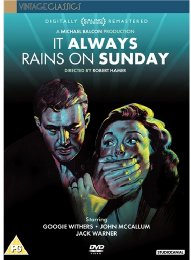
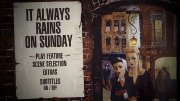
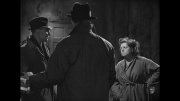
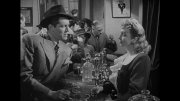

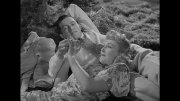
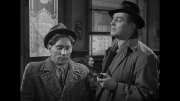
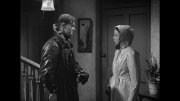
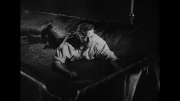

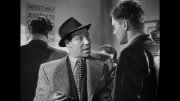
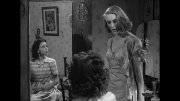










































Your Opinions and Comments
Be the first to post a comment!